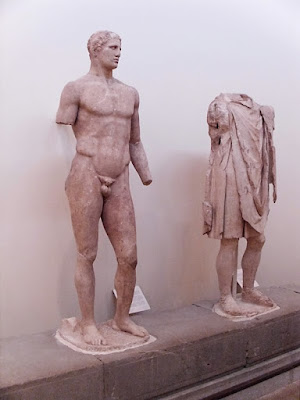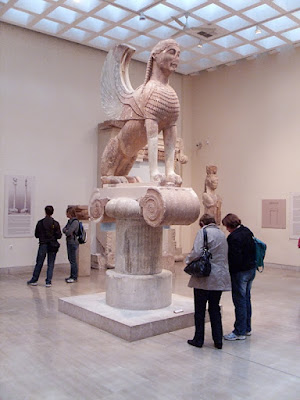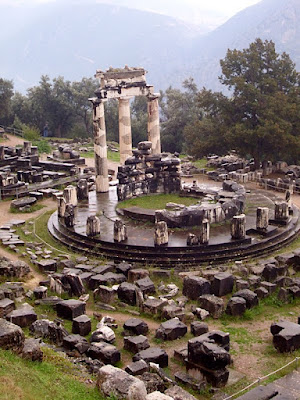


















Mists envelop the Oracle at Delphi
The Oracle is the country’s number two tourist attraction after the Acropolis. In part, this is due to a confluence of destinations nearby.
The extra-long European Rambler hiking trail runs through the area. The Oedipal crossroads are still visible in a nearby tourist town. In winter, there is skiing in this part of Greece.
It is three hours each way from Athens through some beautiful countryside.
The day I went, the Oracle was desnse with mists. The cypress trees were wet. Wrinkled olive fruits, ripe enough to eat, fell and split into oily puckers under the feet of the tourists.
I had befirended an Italian student and a Dutch military man on the bus ride to Delphi. We attempted to find the site unguided in the drizzle. Since the site is not well marked, we wound up about a kilometer above it, unable to hike down except to go the way we came.
When we did reach the Oracle, it was uncrowded. There were a few tours being offered - in Japanese and English. We discovered a wide discrepancy between the adult tourist price and the student price. I paid 9 euros for entrance while students paid nothing. Not 50% off or 70% off, students paid zero!
The archeological museum at Delphi has a collection of artifacts recovered over the last 150 years, including hawk-shaped cauldron handles, larger than life kuros, an Amazon battle frieze, and bronze offerings.
A print by an artist attempting to recreate the look of the Oracle circa 4 BC prompted me to consider how magnificent the site must have been at the peak of it’s influence.
Outside the museum, the ever upward trajectory of The Oracle gave me a feeling for how hearty the early Greek citizens must have been. While it is unlikely the majority of Greeks lived even as long as I have, they would all have needed exceptional mobility to ascend to the upper grounds.
The levels of the Oracle included mausoleum-like treasuries, the temple of Apollo where fortunes were told, public art, a theater, and a stadium. I took lots of pictures and even tried to translate some of the ancient Greek carved into the obelisks.
It is odd that even today Greece does not hold re-enactments or has not re-created any of it’s ancient temples even in part even though copies exist in other parts of the world including Nashville, Tennessee.
Just down the road, one can visit the temple of Athena, flanked by olive trees, and the ancient gymnasium. Admission is free to both these attractions.